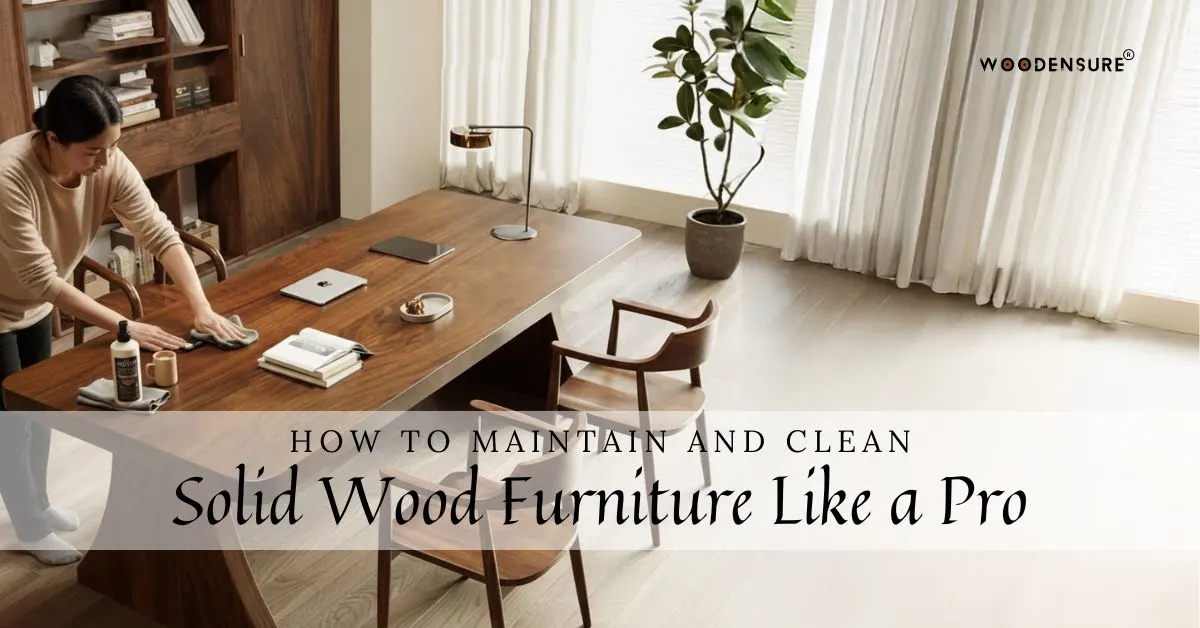
10+ Best Secret Santa Gift Ideas for Coworker ..
Dec 12 - 2025

Solid wood furniture is a timeless investment. Its natural texture, durability, and classic charm make it an essential part of every elegant home. But to keep it looking as good as new, it needs regular care and the right cleaning techniques. Improper cleaning can cause dullness, cracks, or even permanent stains. In this detailed guide, you’ll learn professional methods to clean and maintain your wooden furniture using natural and organic wood cleaners, ensuring your furniture lasts for decades while retaining its natural beauty.
Cleaning solid wood furniture doesn’t have to be complicated, but it must be done carefully. Each cleaning step plays a crucial role in preserving the wood’s finish and texture. Follow these steps for the best results:
Start by dusting your furniture with a soft microfiber cloth. Regular dusting prevents dirt from settling into the wood’s pores. Avoid using rough cloths or feather dusters, as they can cause micro-scratches on the surface.
Instead of harsh chemical sprays, opt for a natural wood cleaner. You can easily make one at home by mixing equal parts of white vinegar and water with a few drops of olive oil. The vinegar acts as a natural disinfectant, while olive oil nourishes the wood and enhances its shine.
Pro Tip: For organic wood cleaner lovers, several eco-friendly brands now offer plant-based wood cleaning solutions that are safe for the environment and your furniture.
Always use a slightly damp cloth—never soak the surface. Excess moisture can seep into the wood and cause swelling or cracks. Wipe the surface gently, following the direction of the wood grain.
Every few weeks, polish your furniture with a beeswax-based polish or a light wood conditioner. This step restores the furniture’s natural sheen and forms a protective barrier against dust and moisture. Polishing also aids in wood furniture preservation by replenishing the oils lost over time.
After cleaning, use a dry cotton cloth to remove any leftover moisture. This ensures that no watermarks or streaks remain, keeping your wooden surfaces spotless.
Cleaning methods can vary depending on the type of wood, finish, and exposure to elements. Below are expert-approved ways to clean different kinds of wooden furniture commonly found in homes:
Acacia wood is known for its resilience, but it’s sensitive to extreme humidity. Clean acacia wood indoor furniture using a mild natural cleaner and soft cloth. Avoid commercial detergents or alcohol-based sprays, as they can dull the finish. Keep acacia wood furniture away from direct sunlight and radiators to prevent drying and cracking.
Sheesham (Indian rosewood) has rich grains that need gentle cleaning. Use a soft dry cloth or a slightly damp microfiber towel. Apply a few drops of lemon oil mixed with water for extra shine. To remove sticky residues, a mixture of warm water and mild dish soap works well—just make sure to dry it thoroughly afterward.
Watermarks and stains are common on solid wood dining tables. To remove them, mix equal parts baking soda and toothpaste, then rub gently with a cloth in circular motions. For stubborn rings, use a hair dryer on a low heat setting—the warmth will draw moisture out of the surface. Finish with a thin coat of polish for a flawless look.
For daily upkeep, avoid over-cleaning. A quick dusting and occasional light polishing are enough. Over-cleaning can strip natural oils and damage the protective layer.
Also read out: Acacia vs. Sheesham Wood: Which Is Better for Furniture?
Preserving the integrity of wood furniture requires a balance between cleanliness and environmental control. Here are the best maintenance practices followed by furniture experts and interior designers alike:
Wood expands and contracts with changes in humidity. Use a humidifier or dehumidifier to keep indoor humidity between 40–50%. This prevents warping and cracking, especially during seasonal changes. Knowing how to protect wooden furniture from humidity can dramatically extend its lifespan.
Sunlight can fade wood finishes and cause discoloration. Position your furniture away from windows or use curtains and blinds to diffuse light. Rotating your furniture occasionally ensures even exposure and prevents uneven fading.
Use coasters, mats, and tablecloths to protect surfaces from scratches, heat marks, and spills. Hot utensils can leave white rings, while sharp objects can damage the finish permanently.
Over time, wood loses its natural oils. Re-oil your solid wood furniture once or twice a year using linseed or tung oil. This not only revives the wood’s rich color but also adds a layer of protection. Always test oil on a hidden spot first to check compatibility.
Twice a year, give your furniture a deep clean. Remove all items, dust thoroughly, apply a mild organic wood cleaner, and polish afterward. This periodic deep cleaning maintains the wood’s natural luster and ensures long-term durability.
Accidents happen—but quick action saves the finish. Wipe spills immediately with a soft dry cloth, then clean the area gently with a damp towel and dry again. Never leave water or liquids to sit on wood surfaces.
Read more: Understanding Wood Checking or Cracking: Causes, Process, and Maintenance Tips
Using organic wood cleaners and natural methods isn’t just good for your furniture—it’s better for your home and the planet. Synthetic polishes often contain chemicals that can harm the wood’s finish over time. Switching to plant-based or homemade cleaners ensures safe, sustainable care.
Shake well before use and spray lightly on a soft cloth. Gently wipe the furniture and buff with a dry towel to reveal a warm, natural shine.
This approach aligns with eco-friendly living and supports long-term wood furniture preservation without compromising quality or appearance.
If your furniture has deep scratches, heavy discoloration, or water damage, consult a professional wood restorer. Attempting aggressive DIY fixes like sanding or bleaching can cause irreversible harm. Professional restoration services can refinish your wood, match stains, and even fix structural issues without affecting the furniture’s integrity.
Quality furniture is meant to last a lifetime. When you buy solid wood furniture online, ensure it’s crafted from responsibly sourced wood and finished with non-toxic materials. Premium craftsmanship and sturdy joinery reduce the need for frequent maintenance. Investing in good furniture saves long-term costs and keeps your space looking elegant and timeless.
At Woodensure, we believe furniture is not just about design—it’s about heritage, sustainability, and lasting quality. Choosing well-crafted pieces and maintaining them properly ensures you enjoy their beauty for generations.
Proper cleaning and maintenance bring out the best in your solid wood furniture. By using natural and organic wood cleaners, controlling environmental factors, and following a simple care routine, you can preserve your furniture’s strength and charm for years. Small, consistent efforts ensure your pieces remain statement-worthy, season after season.
If you’re looking to add a premium wooden centre table, side table, office table, home decor, or accessories to your collection, explore elegant designs and buy solid wood furniture online from Woodensure—where quality meets craftsmanship.
To submit your design drawings or CAD drawing for a quote, call +91- 9358676060, email [email protected] or fill out the form on this page.
Use a soft microfiber cloth to dust your furniture regularly. Mix equal parts of vinegar and water with a few drops of olive oil to make a natural wood cleaner. Wipe gently along the grain and dry immediately.
Use a damp cloth with mild soap and water. Avoid harsh chemicals or excessive moisture. Dry completely and occasionally polish with beeswax for shine and protection.
Wipe with a soft cloth dampened in a natural or organic wood cleaner. Avoid soaking the surface, and always dry with a clean towel. Polish occasionally to maintain sheen.
Mix lemon oil with warm water for gentle cleaning. Use a microfiber cloth and avoid alcohol-based cleaners. Regular dusting and polishing will preserve the wood’s deep color.
Apply a paste of baking soda and non-gel toothpaste. Rub gently and wipe clean. For persistent water rings, use a hair dryer on low heat and re-polish afterward.
Maintain indoor humidity between 40–50%. Use a dehumidifier in damp areas. Avoid placing furniture near walls that trap moisture or close to heating vents.
Combine vinegar, olive oil, and essential oils to make an effective homemade cleaner. You can also use mild dish soap diluted with water for general cleaning.
Keep furniture away from direct sunlight, heat sources, and fluctuating humidity. Re-oil periodically to maintain moisture balance and use protective covers when needed.
SANTASPECIAL
Get 13% additional discount using this coupon